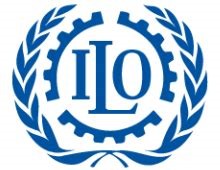As already mentioned in chapter 04.02 History of work, the conditions for workers changed fundamentally for the first time with the industrialisation at the beginning of the 20th century. More and more people no longer worked in farms and crafts, but in factories. This meant that they were no longer integrated into farmer’s and craftsmen’s families, lost their individuality as workers and were exposed to harsher working conditions (assembly line work, long working hours, little rest). The increasing deterioration of the situation of workers led to social unrest in many countries. The states recognised that international labour standards were needed (s. History of the ILO).

In 1919 the International Labour Organization (ILO) was founded; as one of the first agencies of the United Nations (UN; at that time still based on the Treaty of Versailles; s. History of the ILO), based in Geneva, Switzerland. The ILO has 187 state members (August 2022).
The ILO has the following mission:
-
- Definition of standards with fundamental principles and rights for workers
- Creation of greater opportunities for women and men to secure decent employment
- Enhancement of the coverage and effectiveness of social protection for all
- Strengthening of tripartism and social dialogue
The latter mission is also reflected in the organisation of the ILO. The ILO has a tripartite structure. In the ILO, the parties relevant to the shaping of labour relations cooperate, specifically governments, employers and workers. The ILO accomplishes its work through three main bodies, in which these three parties resp. their organisations are represented: International Labour Conference, Governing Body and International Labour Office.
The core of ILO’s work is the definition of standards with fundamental principles and rights for workers. ILO implements these standards in multilateral intergovernmental agreements, called Conventions. Through July 2018, the ILO had adopted 189 Conventions. If these Conventions are ratified by enough governments, they come in force. However, ILO Conventions are considered international labour standards regardless of ratification. When a Convention comes into force, it creates a legal obligation for ratifying nations to apply its provisions. As is regularly the case with international intergovernmental agreements, the Conventions are also supplemented by protocols and recommendations.
In 1998, the 86th International Labour Conference adopted the Declaration on Fundamental Principles and Rights at Work. This declaration contains five fundamental policies:
-
- Freedom of association and the effective recognition of the right to collective bargaining
- Elimination of all forms of forced or compulsory labour
- Effective abolition of child labour
- Elimination of discrimination in respect of employment and occupation
- Safe and healthy working environment
The ILO asserts that its members have an obligation to work towards fully respecting these principles, embodied in relevant ILO conventions. The ILO conventions that embody the fundamental principles have now been ratified by most member states (cp. Wikipedia).
The ILO has a standard supervisory system. The regular system of supervision is based on the examination by two ILO bodies of reports on the application in law and practice sent by member states and on observations in this regard sent by workers’ organisations and employers’ organisations. This system is supplemented by a procedure for representations on the application of ratified conventions, a procedure for complaints over the application of ratified conventions and a special procedure for complaints regarding freedom of association through the Freedom of Association Committee. The latter are not further elaborated here. Reference is made to the detailed information on the ILO website –> Applying and promoting International Labour Standards.
